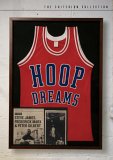| Reviews & Columns |
|
Reviews DVD TV on DVD Blu-ray 4K UHD International DVDs In Theaters Reviews by Studio Video Games Features Collector Series DVDs Easter Egg Database Interviews DVD Talk Radio Feature Articles Columns Anime Talk DVD Savant Horror DVDs The M.O.D. Squad Art House HD Talk Silent DVD
|
DVD Talk Forum |
|
|
| Resources |
|
DVD Price Search Customer Service #'s RCE Info Links |
|
Columns
|
|
|
Hoop Dreams
An enormously popular documentary hit from 1994, Hoop Dreams held audiences spellbound. The almost three hour feature tells the story of two talented basketball hopefuls from Chicago's most dangerous housing projects pursuing a dream of making it as future NBA stars. That means getting on serious high school teams and going "downstate" to compete in high-profile tournament play.
Filmmakers Steve James, Frederick Marx and Peter Gilbert followed Arthur Agee and William Gates for five years, documenting every bit of their lives. Two disadvantaged families struggle to stay together while their potential superstar sons make tough decisions in search of their dreams. It's not easy; the system seems to say that escape from the projects is impossible.
The boys must stay focused on their games and their schoolwork amid family stress and outside distractions. Arthur's father Bo leaves and is seen dealing drugs not far from the neighborhood playground. A well-meaning scout recommends accepting scholarships to an upscale parochial school with a star basketball team, but the deal carries no security. When he can't keep up his part of the steep tuition, one boy must return to his public school at a distinct disadvantage - the private school won't forward his transcripts until his bill is paid. One of the strongest scenes shows his parents bowing and scraping with the school's financial adviser, begging to get the transcripts released in time to give their son a chance of getting into college.
Financial problems are at the core of every crisis. The Gates family loses 25% of its welfare check when William turns 18, which leads to grim hot dog dinners. An unpaid bill results in the power being turned off. But these are strong families; both mothers are dedicated to helping their boys realize their dreams. Emma Gates polices William's study habits and Sheila Agee's support of her boys is almost physical. When Arthur gives her a beautifully worded birthday letter, the pride on her face is its own reward.
Originally judged an unstoppable player with a perfect attitude, William is sidelined by a knee injury that becomes a momentum killer from which he never fully recovers. Colleges use big promises and free visits to recruit both boys, even though their GPA scores may not be high enough to allow them to go. At one rally, filmmaker Spike Lee advises the athletes to get the best deal they can. "These schools don't care about you, " he warns, "They only care about the games you might win for them. "
Arthur and William become magnets for the 'hoop dreams' of others. Older brother Curtis looks to William to fulfill his own lost athletic potential. Curtis and Arthur's father Bo voice support for the boys but also place heavy burdens on them to succeed. This pressure causes some nail-biting moments, as when William is too emotionally keyed-up to make two crucial free throws at the end of a close game.
Tempering the disappointments is Sheila Agee's joyful graduation from nursing class. We care strongly for these people, both the boys that start as wide-eyed fourteen year-olds and the parents who support them.
Hoop Dreams is compelling viewing. For the first time in movie history, the day-to-day realities of life for a disadvantaged American black family are depicted at length and in depth. The editorial selectivity of the filmmakers fashions a believable documentary narrative, helped greatly by the apparent invisibility of the camera crew. Nobody is caught staring at the lens or grandstanding. This can only come from shooting hundreds of hours of video, until the cameras are no longer noticed. There are gaps when Steve James' narration bridges unseen events; we can assume that cameras weren't welcome during arguments and breakups. When the film ends, one boy has moved on to Marquette and the other to a JC, and both are still hoping their dreams will be fulfilled.
Criterion's disc of Hoop Dreams is formatted at the original 1:33 video ratio instead of the cropped and blown-up 35mm version shown in theaters. The image is always acceptable and the audio clear. Disc producer Abbey Lustgarten has elicited strong contributions from everyone concerned with the film. The filmmakers talk about the production of the show on one commentary track while Arthur Agee and William Gates share a separate discussion.
A fat booklet resembling a high school yearbook includes essays from John Edgar Wideman and Sports Illustrated writer Alexander Wolfe. It also has a 2004 follow-up Washington Post article from Michael Wise and a dedication from the filmmakers that bring the changes in the Agee and Gates families up to date.
There are trailers, a music video and three segments from Siskel and Ebert's review show championing Hoop Dreams and promoting it for the Oscars.
On a scale of Excellent, Good, Fair, and Poor, Hoop Dreams rates:
Movie: Excellent
Video: Excellent
Sound: Excellent English (Dolby Digital 2.0 Stereo)
Supplements: Two audio commentaries with stars Arthur Agee and William Gates and filmmakers Peter Gilbert, Steve James, and Frederick Marx; Segments from Siskel and Ebert tracking the acclaim for Hoop Dreams; Music video; Theatrical Trailers
Packaging: Keep case
Reviewed: May 15, 2005
| |
|
| Popular Reviews |
| Sponsored Links |
|
|
| Sponsored Links |
|
|
| Release List | Reviews | Shop | Newsletter | Forum | DVD Giveaways | Blu-Ray | Advertise |
|
Copyright 2024 DVDTalk.com All Rights Reserved. Legal Info, Privacy Policy, Terms of Use,
Manage Preferences,
Your Privacy Choices | |||||||











